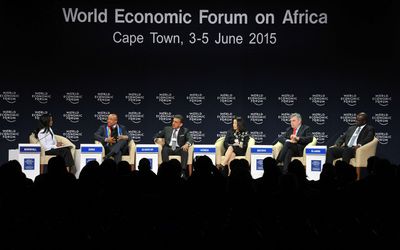PBS: Escaping Eritrea … [Read More...] about ካብ ውሽጢ ቤት ማእሰርታት ኤርትራ
Africa is less risky than you think, says Brown
BY CAROL PATON, 05 JUNE 2015, BUSINESS DAY (South Africa)
THE risks of investing in infrastructure in Africa are far less than imagined and can be mitigated, Gordon Brown, chair of the World Economic Forum Global Strategic Infrastructure Initiative told delegates at the forum’s Africa conference in Cape Town on Friday.
Mr Brown, a former UK prime minister, has become a strong advocate of infrastructure investment in Africa. He was speaking on a panel along with several other global experts as well as President Jacob Zuma on how to accelerate infrastructure development on the continent.

Mr Brown said that Mr Zuma’s initiative in establishing the Presidential Infrastructure Co-ordinating Committee was an important place to start. “You have got to have the political will; you have got to co-ordinate delivery; and have complete emphasis and focus on getting results,” he said.
Mr Brown said that the surplus of savings available in the developed world as well as low interest rates presented great opportunities to accelerate investment in African infrastructure. However, the overriding issue in overcoming infrastructure hurdles was the perception of risk, he said. “We have got to persuade investors that the risk they perceive is not as great as the risks that exist. We have to find a way to demonstrate that the risks can be dealt with.”
For instance, the Grand Inga scheme could be the biggest hydroelectric project in the world and would have the capacity to provide 40% of the continent with energy. But private investors would need to be brought on board for it to materialise. Washington-based Multilateral Investment Guarantee Agency (Miga) CE Keiko Honda told the panel that it was now more possible to mitigate against noncommerial risk through investment guarantees. Miga, for instance, offered guarantees against currency risk; political disturbances and war; expropriation; and breech of contract.
“The political risk insurance we have been doing is well tested in the market. Of the four, the most important is insurance against breech of contract,” she said. The initial stages of project funding, during which proposals were put together and feasibility investigated, remained the most difficult to fund, said the panel. Development Bank of Southern Africa CE Patrick Dlamini said the main challenge of infrastructure development was the structuring of projects.
“We need effective deployment of risk capital in project preparation. This needs serious funding, which can only really come from national development finance institutions and multilateral banks.” Mr Brown said that multilateral banks needed to take on more responsibility for the initial funding for projects as commercial funders were likely to fund a project only once they knew it would get off the ground.
